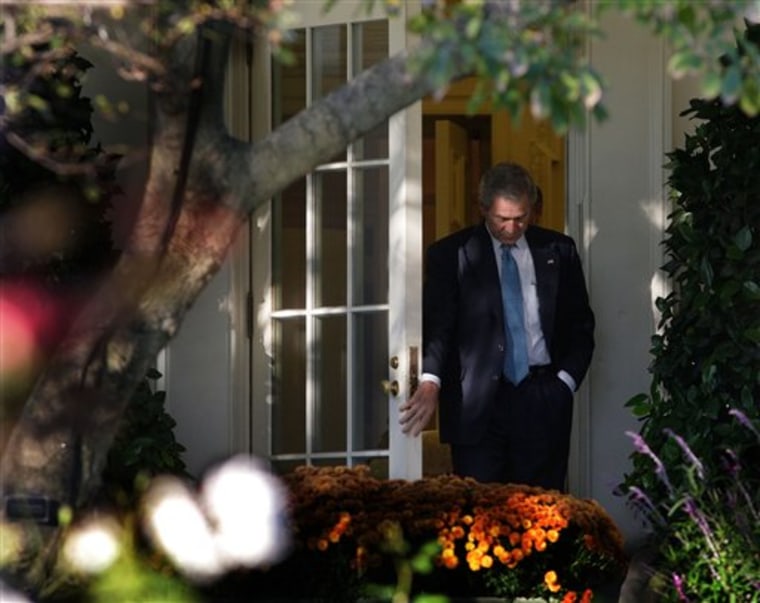An increasingly confrontational President Bush on Friday vetoed a bill authorizing hundreds of popular water projects even though lawmakers can count enough votes to override him.
Bush brushed aside significant objections from Capitol Hill, even from Republicans, in thwarting legislation that provides money for projects like repairing hurricane damage, restoring wetlands and preventing flooding in communities across the nation.
This level of opposition virtually assured that Bush would have a veto overridden for the first time in his presidency. He has used the veto very sparingly for most of the time he has been in office, but has made more use of it recently.
"When we override this irresponsible veto, perhaps the president will finally recognize that Congress is an equal branch of government and reconsider his many other reckless veto threats," said Senate Majority Leader Harry Reid, D-Nev.
"More than two years after failing to respond to the devastation and destruction of Hurricane Katrina, he is refusing to fund important projects guided by the Army Corps of Engineers that are essential to protecting the people of the Gulf Coast region."
At issue
The $23 billion water bill passed in both chambers of Congress by well more than the two-thirds majority needed to override a veto and make the bill law.
Bush objected to the $9 billion in projects added during negotiations between the House and Senate. He hoped that his action, even though it is sure not to hold, would cast him as a friend to conservatives who demand a tighter rein on federal spending.
But Bush never vetoed spending bills under the Republican Congress, despite budgetary increases then, too. Attempting to demonstrate fiscal toughness in the seventh year of his presidency, Bush risks being criticized for doing too little, too late and of waging a transparently partisan attack against the Democrats who now run Capitol Hill.
The president took the gamble, though without any public fanfare, making it part of a broader effort to take on Democratic leaders frequently and more pointedly.
White House spokesman Tony Fratto said Bush issued veto threats under the GOP-controlled Congress that were enough to do the job.
"Republicans heeded the president's concerns, stayed within his spending caps, and avoided vetoes," he said. "Democrats are intent on exceeding those caps, and if they do the President will veto those bills."
Bush: Congress being fiscally irresponsible
The water project legislation originally approved by the Senate would have cost $14 billion and the House version would have totaled $15 billion. Bush and a few Republicans complained that the final version was larded with unneeded pet projects pushed by individual lawmakers - sending the overall cost of the bill much higher.
"Only in Washington could the House take a $14 billion bill into a conference with the Senate's $15 billion bill and emerge with a compromise that costs taxpayers over $23 billion," said White House press secretary Dana Perino.
Bush vetoed the bill because it is "fiscally irresponsible" and falls outside the scope of the mission of the Army Corps of Engineers, she said
Critics noted the Corps already has a backlog of $58 billion worth of projects and an annual budget of only about $2 billion to address them.
Projects approved but spending pending
If Bush is overridden, the measure would give a green light to projects in virtually every state. It only authorizes the projects; the actual funding must be approved separately.
The authorizations include:
- $3.6 billion for major wetlands and other coastal restoration, flood control and dredging projects for Louisiana, a state where coastal erosion and storms have resulted in the disappearance of huge areas of land;
- nearly $2 billion for the restoration of the Florida Everglades;
- nearly $2 billion for the Army Corps of Engineers to build seven new locks on the upper Mississippi and Illinois rivers;
- $7 billion for various projects related to hurricane mitigation in Mississippi and Louisiana, including assuring 100-year levee protection in New Orleans;
- hundreds of smaller dredging, wetlands restoration and flood control projects across the country.
The Congressional Budget Office says the bill includes projects that, if fully funded, would cost $11.2 billion over the next four years and $12 billion in the decade after that. The bill also calls for increased oversight of the Corps, requiring an outside review of water construction projects.
The veto was Bush's fifth. Four of those have come since Democrats took over Congress in January, but this one was unusual because it also pits the president against a sizable number of lawmakers from his own party. Previous Bush vetoes include his blocking of a bill allowing expanded federal research using embryonic stem cells, and a spending bill that would have required troop withdrawals from Iraq.
Last month, Bush vetoed a major expansion of a children's health insurance program, also over objections from some Republicans. But he has far more partisan unity on that issue than on the water projects bill. It was the first time Bush went into a veto knowing it was a futile effort. This turns the tables somewhat on him, as he has been criticizing Democrats almost daily for wasting time by passing legislation they knew he would not accept.
